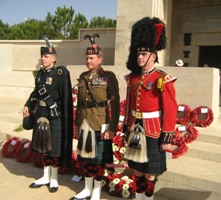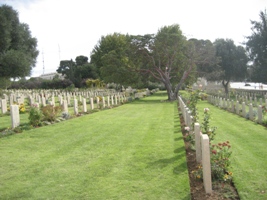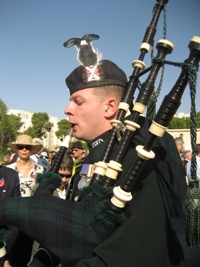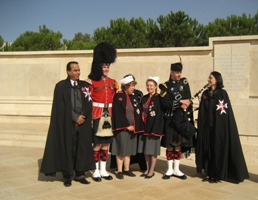World War I left a deeply scarred western society. The millions left dead, the crippled and the returning soldiers who could not find peace in the postwar world changed the face of Europe for good. These days the trauma is slowly fading away. In 2009, the last man who could boast for taking part in the war as a soldier in the Egyptian Expeditionary force to the Sinai Peninsula and Palestine, had passed away. Knowing all that I thought it to be appropriate if I took part in the ceremony that commemorates the end of the war. The ceremony takes place every year in the Commonwealth war graves cemetery situated on Mount Scopus, in the morning of a Saturday which is close to November 11th (The day in which the end of war ceasefire came into force). Actually the ceremony commemorates not only the slain in the war but also a few other events but as there are only soldiers from World War I buried in the Jerusalem War Cemetery the ceremony feels as if it perpetuates those soldiers who served under Field Marshal Sir Edmund Henry Hynman Allenby.
The Jerusalem War Cemetery is not unique. There are seventeen more cemeteries west to the Jordan river where the slain soldiers from World War I are buried. The British empire did not send the bodies of the dead back to their homeland, but buried them in the place where they met their death. The British poet Rupert Brooke wrote it well in his poem
“If I should die, think only this of me: That there’s some corner of a foreign field That is for ever England…”
Rupert Brooke, As an irony of fate, Joined His Majesty’s Armed Forces during World War I and passed away from a disease while he was heading to the battle of Gallipoli. As a British soldier he was buried in the Greek island of Skyros. Thanks to the British burial tradition we have in Jerusalem a green, calm cemetery that truly looks like some corner of a foreign field with a distinct British character. The place is maintained throughout the year by the CWGC – Commonwealth War graves Commission that hired three gardeners in Jerusalem. One of the Gardeners, Mustafa, works here for more than 40 years.
Many representatives from all sorts of organizations that operate in Israel came to the Saturday morning ceremony. With them stood of course diplomats from embassies and consulates that represented the countries who fought the war. I could recognize high ranking officers from a variety of armed forces, all wearing the official military uniform, who stood along with local clergymen and some curious Israelis. The British Consul opened the ceremony and was joined by the church representatives. All of a sudden, an unusual sound to the ears of us Israelis went through the air – it was the sound of bagpipes. The British soldier who played the bagpipes was wearing magnificent Scottish uniform and while playing he started walking in a moderate pace to the back of the cemetery. He passed so close to were I was standing that I could almost feel his breath but instead my attention was drawn to his ear – embarrassingly it was stuffed with earplugs. I must admit that if you consider the fact that his fellow Bugler wasn’t doing such a great job maybe he did the right thing… The ceremony went on and the act of remembrance was read. As a part of the ceremony, a portion of the “Ode of remembrance” by Laurence Binyon was read. The ode ends with the words “we will remember them”. These words became an important part in many remembrance ceremonies.
The distinguished representatives placed wreaths, the priests read a few more lines from the bible and the ceremony was over. A few more photos and some diplomatic conversations and the crowd dispersed. All official representatives were invited to the house of the British consul in Jerusalem and we went along. The house is located in the heart of Sheikh Jarrah neighborhood in East Jerusalem. It is a breathtaking, wall guarded place and it has a beautiful garden where you can organize a nice cocktail party. Walking past the living room we could see rare porcelain vases and an impressive mix of works of arts and crafts that were probably given to the British representatives in Jerusalem over the years. The modest reception in the garden was really British in atmosphere with small talks and polite smiles and of course – Tea. After all, the house of the British consul is another English corner that lies in a foreign field.



